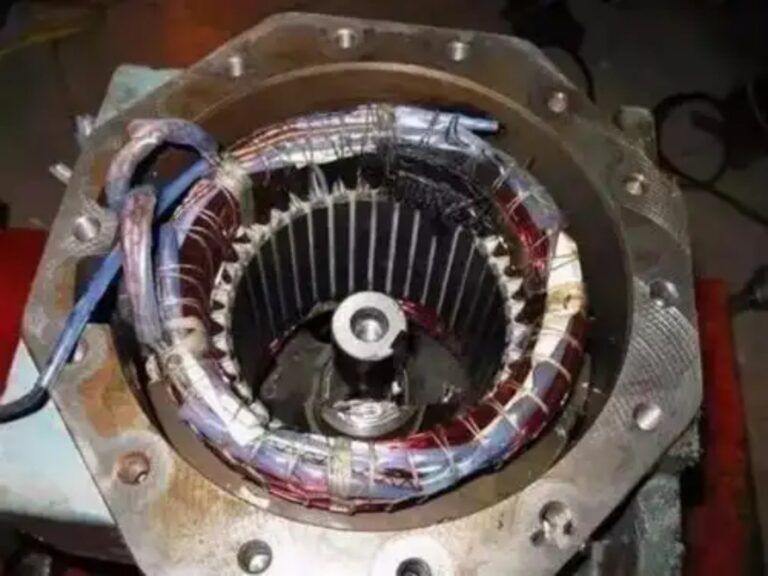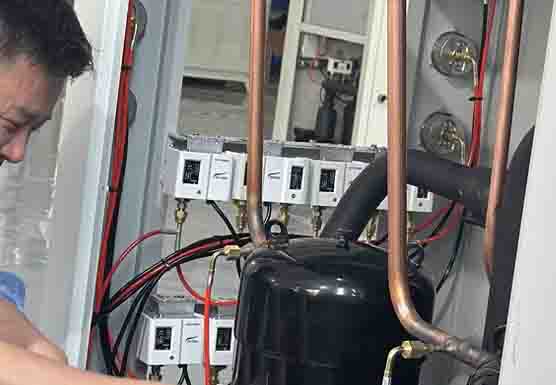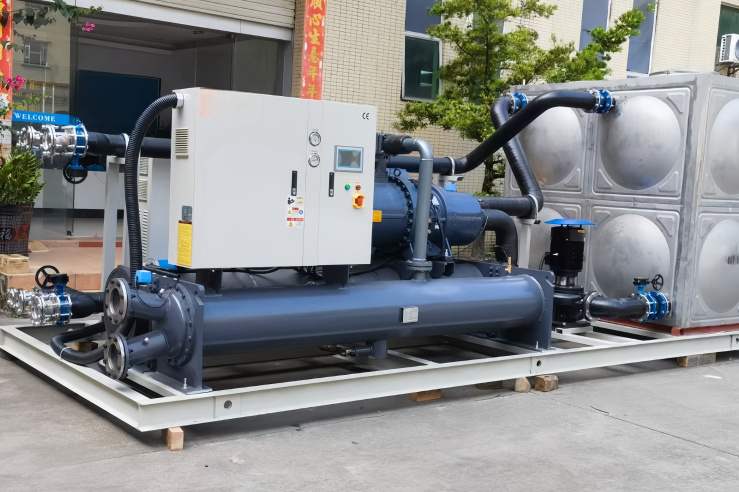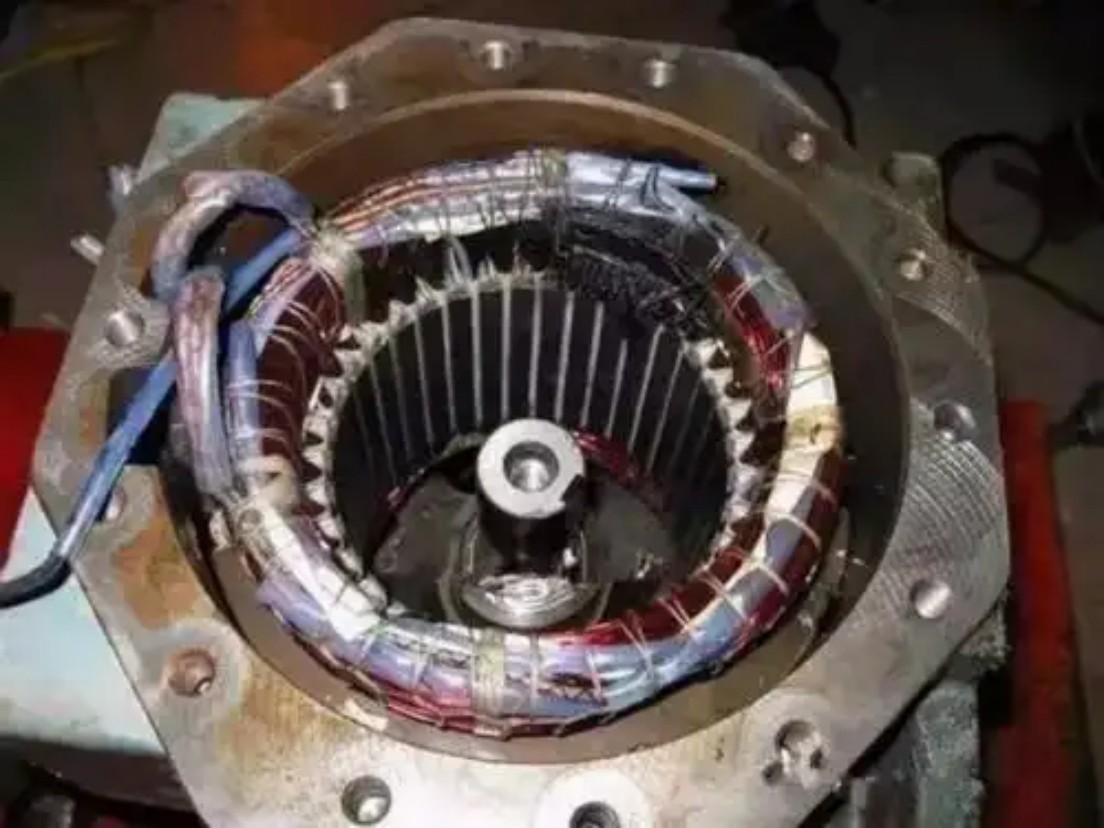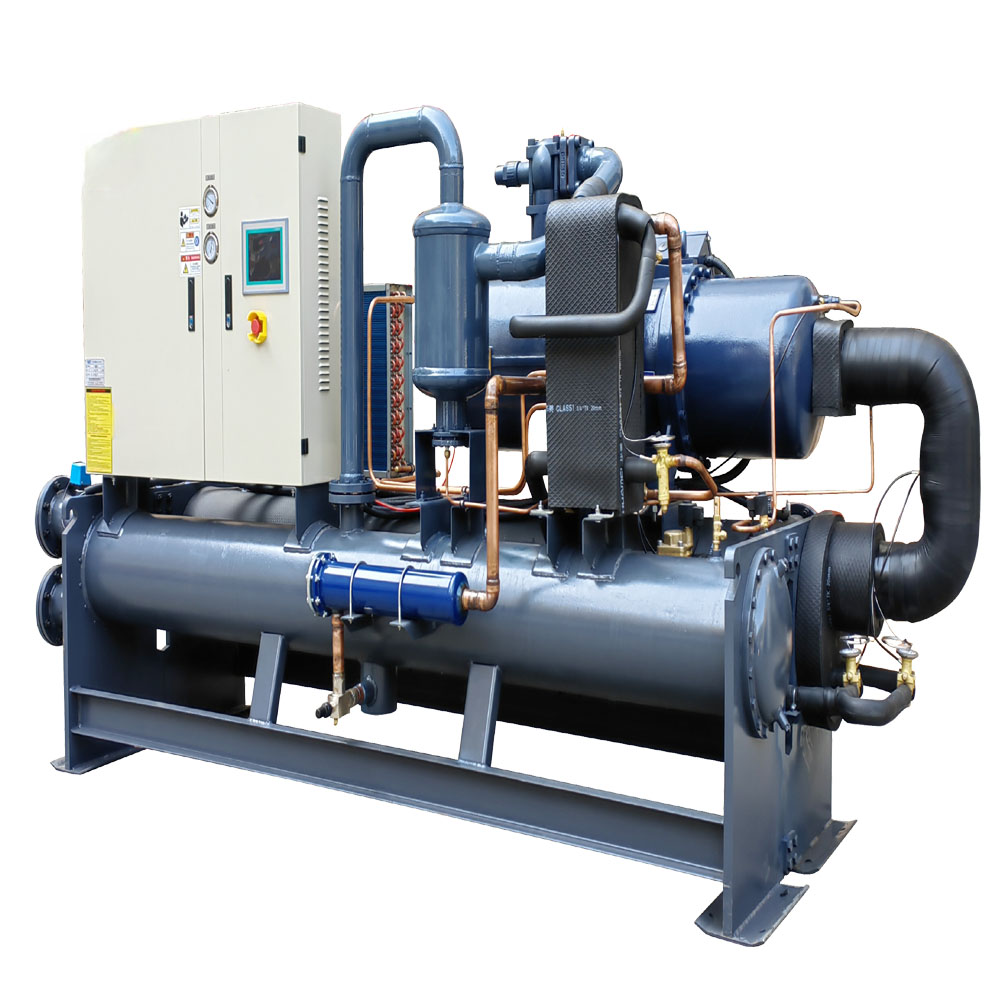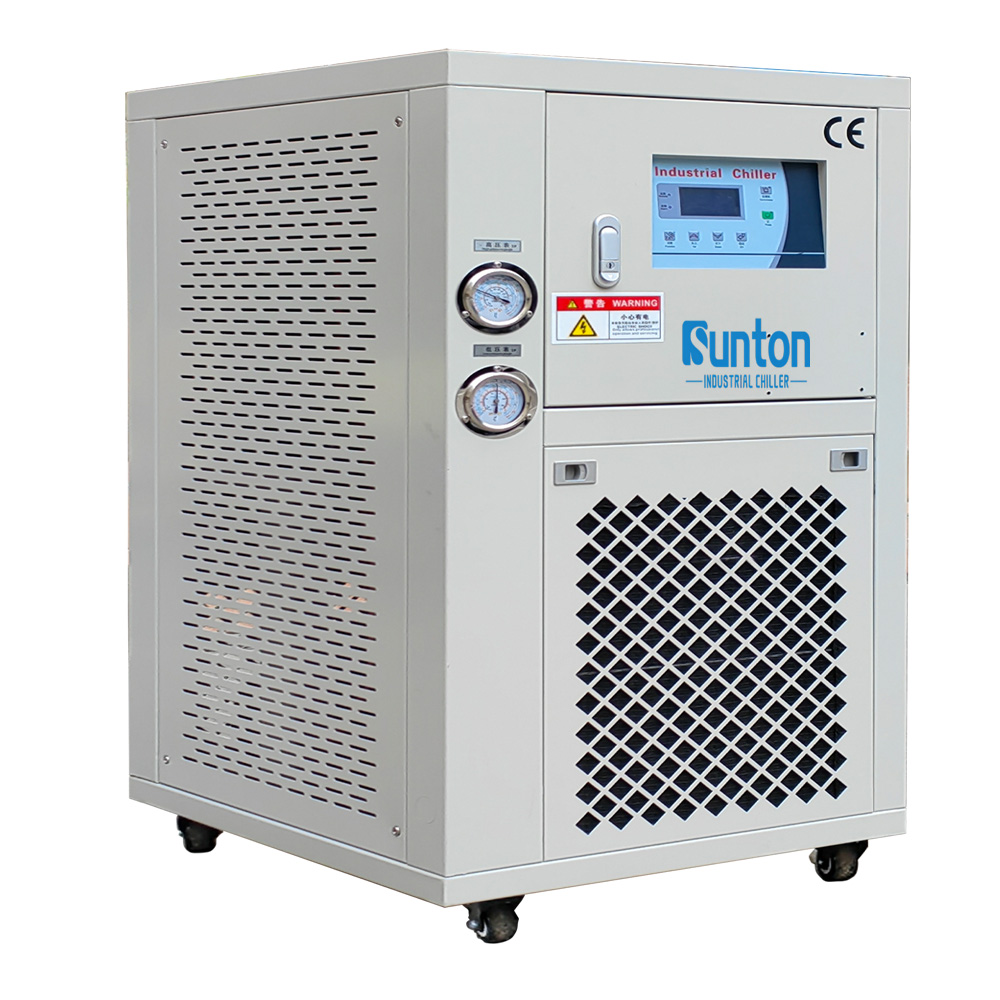-
달링산 산업 광동
산업용 공랭식 공정 냉각기
플라스틱 금형 제조업체를 위한 산업용 냉각기의 힘을 알아보세요
산업용 냉각기는 다음에 필수적입니다. 플라스틱 금형 제조. 산업 공정에는 정밀한 온도 제어가 필요합니다. 정교한 시스템은 온도를 정밀하게 관리하여 공정 효율성과 제품 품질을 보장합니다. 이 기사에서는 산업용 냉각기의 이점과 제조업체가 최적의 성능과 냉각을 위해 산업용 냉각기를 필요로 하는 이유를 설명합니다. 산업용 냉각기의 세계를 탐구하고 생산 라인을 개선하는 데 있어서 산업용 냉각기가 차지하는 중요한 역할을 알아보겠습니다.
목차
- 산업용 냉각기란?
- 산업용 냉각기는 어떻게 작동하나요?
- 산업용 냉각기 유형
- 플라스틱 금형 제조에 냉각기를 사용하는 이유는 무엇입니까?
- 공랭식 대 수냉식 냉각기: 어느 것이 더 낫나요?
- HVAC 시스템용 냉각기에서 압축기의 역할은 무엇입니까?
- 냉매 및 응축기 이해
- 더 나은 금형 품질을 위한 효율적인 열 관리
- 고객 성공 사례: 제조에 대한 냉각기 영향
- 산업용 냉각기에 대한 FAQ
산업용 냉각기란?
안 산업용 냉각기 이다 냉각 시스템 증기 압축 또는 흡수 냉각 사이클을 통해 액체에서 열을 제거하도록 설계되었습니다. 이러한 냉각기는 제어된 온도 조건이 필요한 프로세스에 필수적입니다. 플라스틱 금형 제조.
왜 필수적인가요?
제조업체의 경우 온도 제어는 제품의 일관성과 품질을 유지하는 데 매우 중요합니다. 산업용 냉각기는 다음을 관리하는 데 도움이 됩니다. 냉각 과정, 재료가 과열되지 않도록 하여 제품 결함이 발생하지 않도록 합니다.
- 온도 유지: 정확한 온도 제어를 보장합니다.
- 효율성 증가: 가동중단 시간을 줄이고 생산율을 향상시킵니다.
- 제품 품질을 향상시킵니다: 성형품의 열 관련 결함을 방지합니다.
산업용 냉각기는 어떻게 작동하나요?
산업용 냉각기는 순환을 통해 작동합니다. 냉매 프로세스에서 열을 흡수합니다. 그런 다음 열은 다음을 통해 방출됩니다. 응축기. 이 사이클은 여러 구성 요소에 의해 매개됩니다.
주요 구성 요소
- 압축기: 냉각기의 심장부이며 냉매를 순환시켜 압력을 높여줍니다.
- 증발기: 냉각수에서 열을 흡수하여 온도를 낮춥니다.
- 콘덴서: 흡수한 열을 대기 또는 냉각수원으로 방출합니다.
냉각기 또한 활용하다 팽창 밸브 냉매 흐름을 조절하여 냉각 사이클의 효율성을 최적화합니다.
산업용 냉각기 유형
다양한 것을 이해하다 산업용 냉각기 유형 귀하의 필요에 맞는 올바른 시스템을 선택하는 데 도움을 드릴 수 있습니다.
수냉식 냉각기
이 제품은 외부 산업용 냉각기 시스템의 물을 사용합니다. 냉각탑 열을 제거합니다. 상당한 열 부하를 처리할 수 있는 능력으로 인해 효율적이고 대규모 작업에 적합합니다.
공냉식 냉각기
이것들은 공기를 사용합니다 냉매를 식히다. 이들은 물을 쉽게 구할 수 없는 상황에서 종종 사용됩니다. 이들은 유지 관리가 덜 필요하고 일반적으로 설치 비용이 저렴합니다.
글리콜 냉각기
이것은 낮은 온도가 필요할 때 사용됩니다. 글리콜은 냉각기의 효율성을 개선하여 특정 산업 응용 분야에 이상적입니다.
플라스틱 금형 제조에 냉각기를 사용하는 이유는 무엇입니까?
를 사용하여 프로세스 냉각기 플라스틱 금형 제조에서는 다음과 같은 여러 가지 이유로 필수적입니다.
생산의 일관성
A 냉각기 성형 기계가 최적의 온도에서 작동하여 제품의 일관성에 영향을 줄 수 있는 변동을 방지합니다.
- 과열 방지: 금형에 적합한 온도를 유지합니다.
- 균일성을 보장합니다: 일관되고 고품질의 제품을 생산합니다.
에너지 효율성
최신 냉각기는 에너지 효율이 높게 설계되어 제조 공정에서 일정한 온도를 유지하는 데 드는 운영 비용을 낮춥니다.
공랭식 대 수냉식 냉각기: 어느 것이 더 낫나요?
다음 중에서 선택 공랭식 그리고 수냉식 냉각기는 귀하의 특정 산업적 요구에 따라 달라집니다.
공랭식 냉각기의 이점
- 초기 비용 절감: 설치가 더 쉽고 저렴합니다.
- 유지 관리가 덜 필요함: 냉각탑이 필요 없습니다.
수냉식 냉각기의 장점
- 더 높은 효율성: 주변 온도가 높은 환경에 더 적합합니다.
- 더 긴 수명: 더욱 견고하여 고강도 작업에 이상적입니다.
냉각기에서 압축기의 역할은 무엇인가?
그리고 압축기 모든 것에 필수적입니다 냉각기 시스템. 냉매를 압축하여 압력과 온도를 높이는 역할을 하는데, 이는 냉장 사이클이 효과적으로 작동하는 데 중요합니다.
압축기의 종류
- 스크롤 압축기: 효율적이고 조용합니다.
- 왕복 압축기: 내구성이 뛰어나고 용량이 작은 시스템에 적합합니다.
냉매 및 응축기 이해
냉매 열을 전달하여 냉각 과정에서 중요한 역할을 합니다. 응축기 그런 다음 이 열을 방출하여 냉장 사이클이 완료됩니다.
냉매의 종류
R134a와 R410a와 같은 냉매는 효율성이 높고 환경에 미치는 영향이 낮아 일반적으로 사용됩니다.
콘덴서 기능
응축기는 냉각기 유형에 따라 공랭식 또는 수랭식으로 냉각될 수 있으며, 이를 통해 시스템에서 열을 효율적으로 방출할 수 있습니다.
더 나은 금형 품질을 위한 효율적인 열 관리
효과적인 열 관리 in 산업용 응용 프로그램 플라스틱 성형에서 최고의 품질을 보장합니다:
- 결함을 줄입니다: 재료 응력을 최소화합니다.
- 금형 방출 개선: 제품 탈형 공정을 간소화합니다.
고객 성공 사례: 제조에 대한 냉각기 영향
"새로운 산업용 냉각기로 전환하면서 생산량이 크게 향상되었고 냉각 비용이 30%만큼 감소했습니다." – 플라스틱 금형 제조업체 James T.
이는 고품질 산업용 냉각기가 제조 효율성과 비용 절감에 미치는 영향을 보여주는 많은 성공 사례 중 하나입니다.
산업용 냉각기에 대한 FAQ
플라스틱 성형에서 냉각기는 어떻게 작동하나요?
냉각기는 성형 제품의 일관성과 품질에 중요한 일정한 온도를 유지합니다.
표준 냉각 방법 대신 산업용 냉각기를 선택해야 하는 이유는 무엇입니까?
산업용 냉각기는 정밀한 온도 제어를 제공하여 결함과 가동 중지 시간을 줄여줍니다.
냉각기 유형을 선택하는 데 영향을 미치는 요소는 무엇입니까?
용량, 유입 및 유출 수온 수요, 물 흐름, 냉각 요구 사항, 환경 조건 및 운영 비용을 고려하세요.
수냉식 냉각기가 공랭식 냉각기보다 효율적입니까?
네, 수냉식 냉각기는 일반적으로 더 효율적이며, 특히 더운 기후에서는 그렇습니다.
결론
결론적으로, 투자는 산업용 냉각기 모든 것에 중요합니다 플라스틱 금형 제조업체 일관성, 에너지 효율성 및 제품 품질을 추구합니다. 올바른 냉각기를 선택하는 것은 귀하의 특정 요구 사항과 사용 가능한 냉각기 유형을 이해하는 것으로 시작됩니다. 이러한 시스템은 정확한 온도 제어를 유지함으로써 원활한 운영과 고품질 제품을 보장하는 데 도움이 됩니다. 추가 지침과 냉각기 범위를 알아보려면, 문의하기.
주요 내용:
- 냉각기는 안정성과 품질을 보장합니다 제조 과정에서.
- 유형에는 공랭식, 수냉식, 글리콜 냉각기 등이 있습니다.
- 플라스틱 성형에 필수 과열을 방지하고 일관성을 유지합니다.
- 효율적인 에너지 사용 운영 비용이 절감되고 생산성이 향상됩니다.
- 적합한 유형의 냉각기 선택 환경 및 운영 요인에 따라 달라집니다.
자세한 내용은 다음을 확인하세요. 공냉식 스크류 냉각기 그리고 수냉식 스크류 워터 칠러 귀하의 요구 사항에 맞춰 최적의 성능을 제공하는 맞춤 솔루션입니다.

